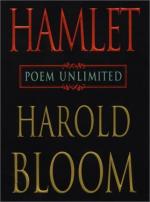|
This section contains 4,164 words (approx. 14 pages at 300 words per page) |

|
SOURCE: "Bloom, Freud, and 'America'," in The Kenyon Review, Vol. VI, No. 3, Summer, 1984.
In the following essay, Wyatt uses Bloom's own theoretical approach to examine the significance of Freud and American literature in Bloom's work.
Harold Bloom's theory of poetic influence is the most controversial and influential of our time. It is an overtly psychological theory: in Agon, published in 1982, Bloom asserts that we live in the Age of Freud. Bloom argues that the relations between poets are the true subject of literary history, and that these relations are characterized by all the envy, guilt, ambivalence and love that create the Oedipal family. Strong poets suffer in particular an acute anxiety of belatedness. Their writing consists of a series of defenses against the sense that they have been born too late to do any truly original work. In twelve books published over nearly three decades, Bloom has almost...
|
This section contains 4,164 words (approx. 14 pages at 300 words per page) |

|


